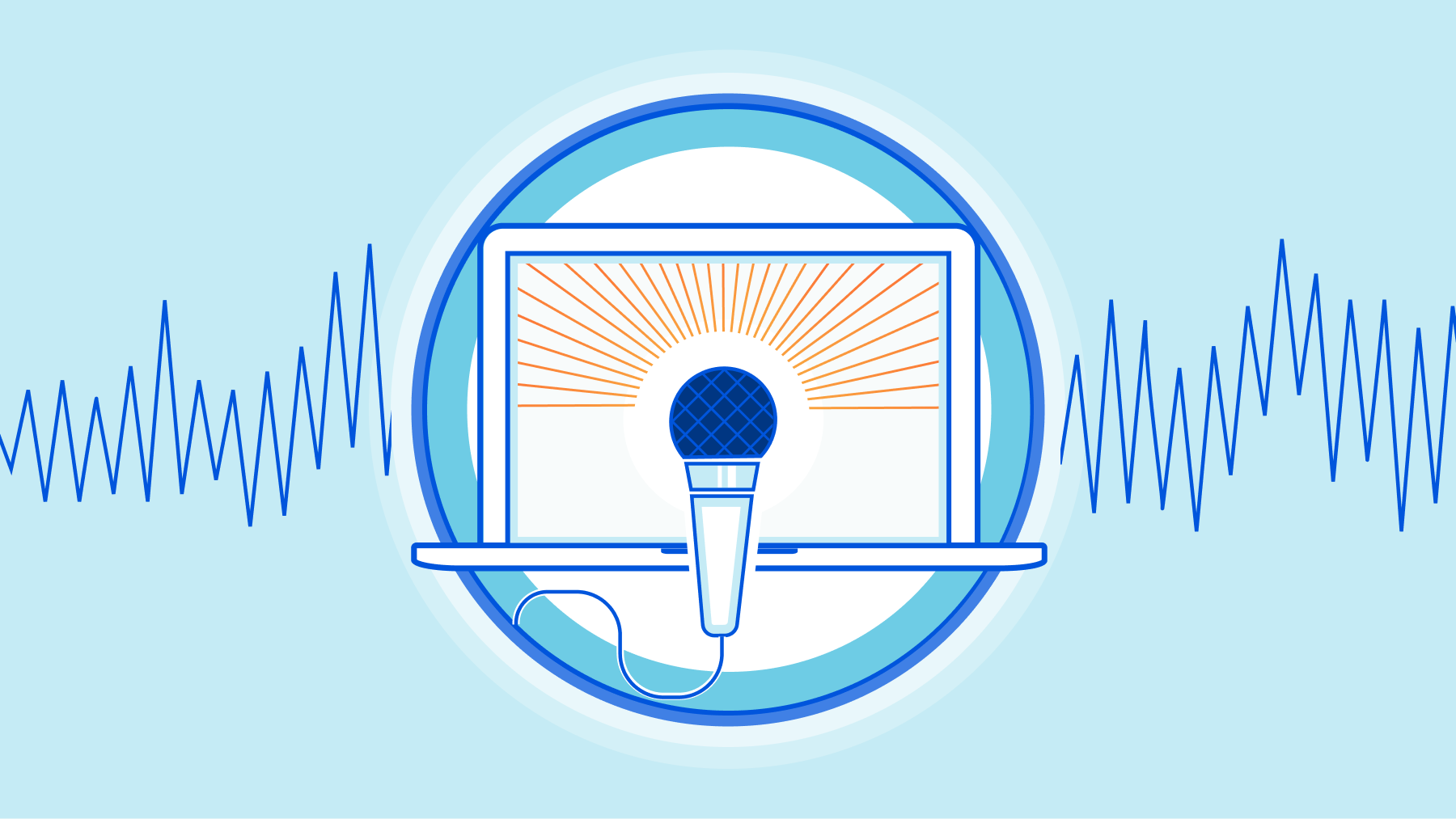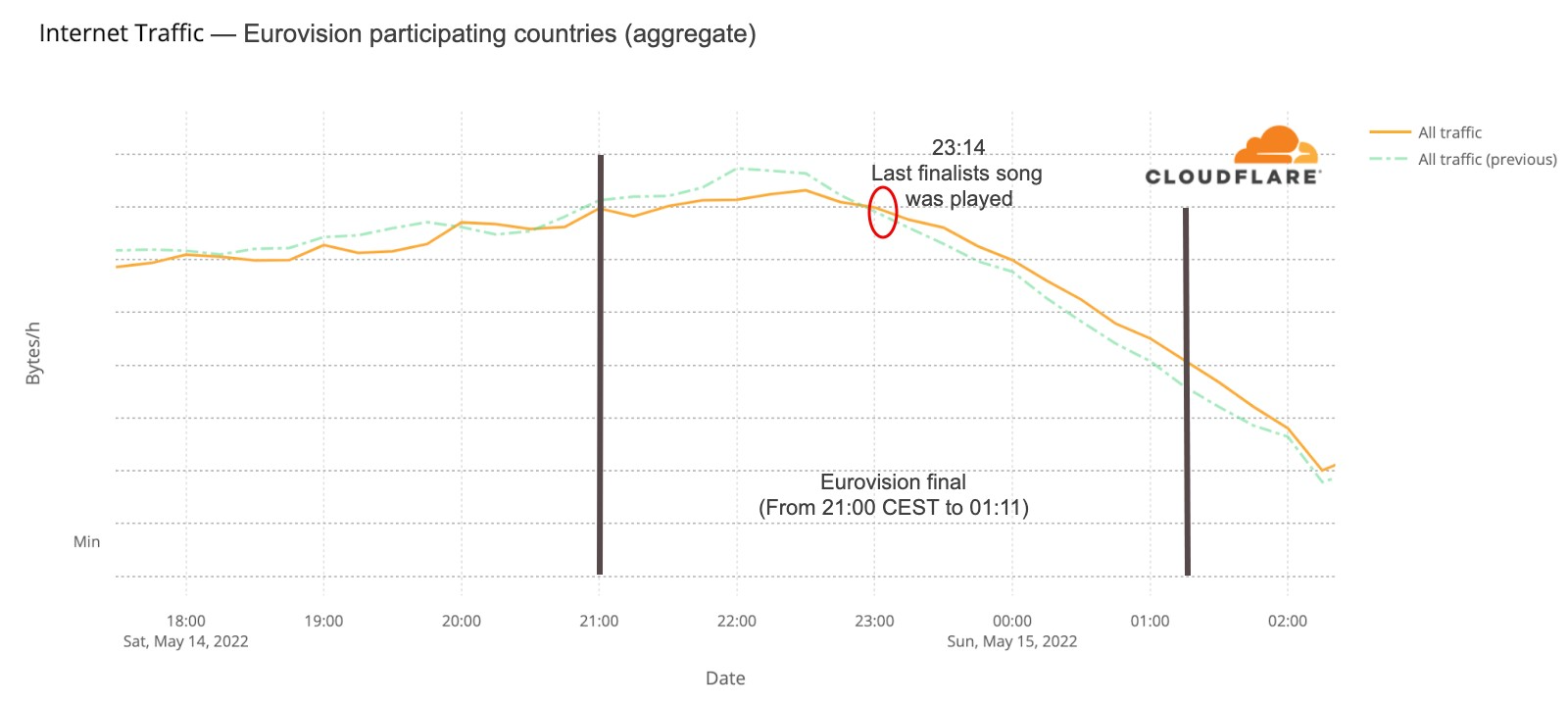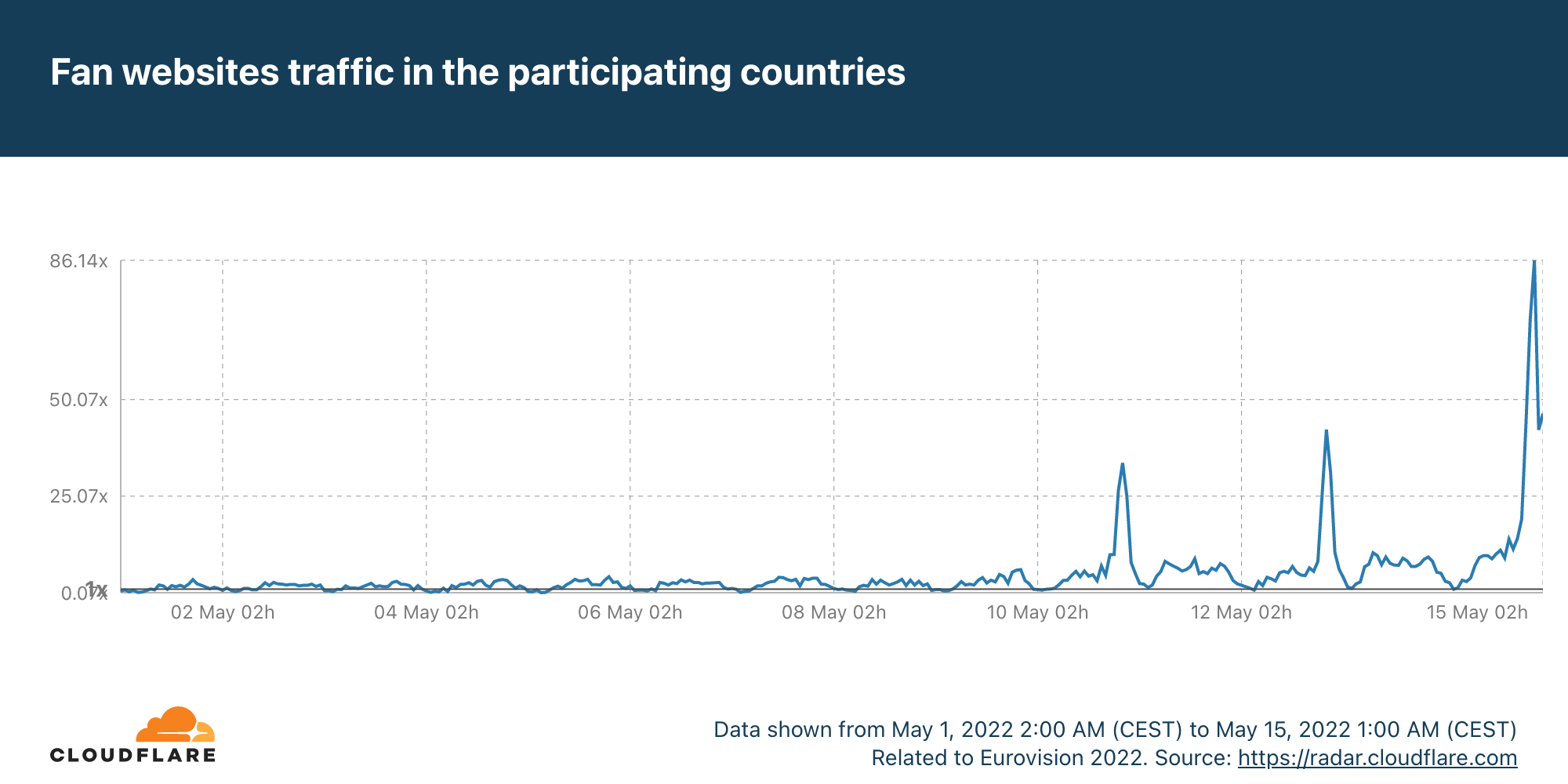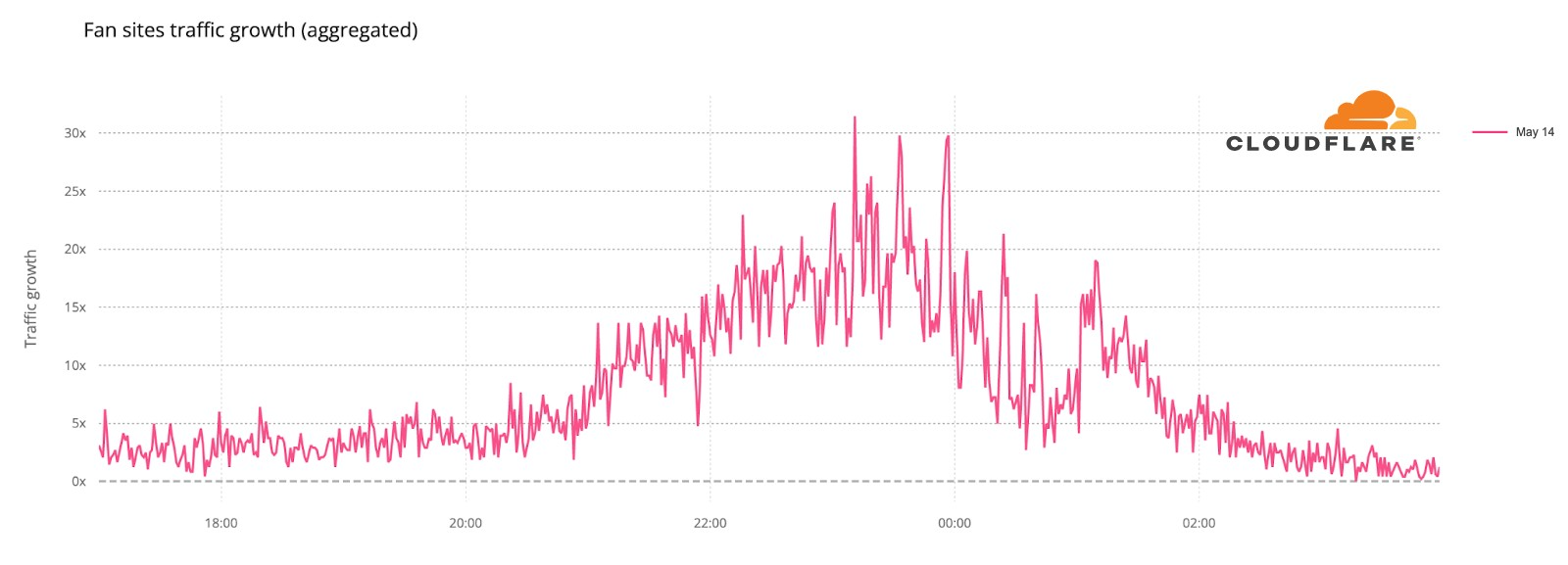Eurovision 2022, the Internet effect version


There’s only one song contest that is more than six decades old and not only presents many new songs (ABBA, Celine Dion, Julio Iglesias and Domenico Modugno shined there), but also has a global stage that involves 40 countries — performers represent those countries and the public votes. The 66th edition of the Eurovision Song Contest, in Turin, Italy, had two semi-finals (May 10 and 12) and a final (May 14), all of them with highlights, including Ukraine’s victory. The Internet was impacted in more than one way, from whole countries to the fan and official broadcasters sites, but also video platforms.
On our Eurovision dedicated page, it was possible to see the level of Internet traffic in the 40 participant countries, and we tweeted some highlights during the final.
#Ukraine just won the #Eurovision in Turin, #Italy
— Cloudflare Radar (@CloudflareRadar) May 14, 2022
Video platforms DNS traffic in Ukraine today, during the event, was 22% higher at 23:00 CEST compared to the previous Saturday. The @Eurovision final is being transmitted live via YouTube.
— @Cloudflare data. pic.twitter.com/juBmtDj1FP
First, some technicalities. The baseline for the values we use in the following charts is the average of the preceding week, except for the more granular minute by minute view that uses the traffic average of May 9 and 10 as baseline. To estimate the traffic to the several types of websites from the 40 participating countries, we use DNS name resolution data. In this blog post, we’re using CEST, Central European Summer Time.
It's not often that an entertainment event has an impact on a country’s Internet. So, was there an impact on Eurovision nights?
Let's start with aggregate Internet traffic to the 40 participant countries (Australia included). In the first May 10 semi-final, there seems to be a slight decrease in traffic during the contest — it makes sense if we think that most people were probably watching the broadcast on national TV (and not on YouTube, that was also transmitting live the event). Traffic was lower than in the previous period between 21:00 and 23:00 (the event was between 21:00 to 23:14), but it was back to normal at 23:00.

For the second semi-final that trend is less clear. But the May 14 final (that lasted from 21:00 CEST to 01:10) told a different story. Traffic was 6% lower than on the previous Saturday after 21:00, mostly around 22:00, and after 23:15 it was actually higher (between 4% and 6%) than before and continued that way until 02:00.
What happened at that 23:15 time in Eurovision? The last of the 25 songs at the contest was Estonia’s “Hope”, by Stefan, and it ended at 23:14 (also in this blog post we will also see how 23:16 was the highest spike in terms of DNS traffic to fan websites during the final). This is the Internet traffic in the participating countries on May 14 chart:

There were several countries that showed similar impact in terms of traffic change during at least the final. France, UK, Germany, Iceland, Greece and Switzerland are examples.
Eurovision & the UK
The UK was one of the countries where there seems to be more impact during the time of the grand final — last year, according to the ratings, eight million were watching the BBC transmission with the commentator Graham Norton. Traffic started to drop to lower levels than usual at 20:30 (a few minutes before the final) and was 20% lower at 22:00, starting to go closer to normal levels after 23:00, when the set of 25 finalists' songs came to an end.
Here’s the UK’s Internet traffic trend during the Eurovision May 14 final:

Fan sites: what a difference a winner makes
The most obvious thing to check in terms of impact are the fan websites. Eurovision has many, some general (there’s the OGAE, General Organisation of Eurovision Fans), others more local. And DNS traffic to them was clearly impacted.
The first semi-final, on May 10, had 33x more traffic than in the average of the previous week, with a clear 22:00 CEST spike. But the second semi-final, May 12, topped that, with 42x more traffic at the same time. The final, with the 25 finalists, clearly surpassed that and at 22:00 traffic was already 70x. But because the final was much longer (in the semi-finals it was around 23:00 that the finalists were announced), the peak was reached at 23:00, with 86x more traffic than usual.

“We have a winner. The winner of the Eurovision Song Contest 2022 is… Ukraine!”.
— Alessandro Cattelan, Laura Pausini and Mika at 01:01 CEST, May 15, 2022.
Saturday’s final was more than four hours long (the semi-finals took little over two hours), and it finished a few minutes after 01:00 CEST. DNS traffic to fan websites dropped from 86x to 45x at midnight, but it went up again to 49x more traffic when it was already 01:00 CEST in most of Europe and Ukraine was announced the winner of Eurovision 2022. This next chart shows Saturday’s May 14 final traffic change to fan sites:

We can also clearly see that on Sunday morning, at 09:00, there was a 20x peak to fan sites, and also at 11:00 (17%).
Now, let’s go deeper by looking at a minute by minute view (the previous charts show hourly data) of DNS traffic to fan sites. In the two semi-finals it's easy to see that the moment the finalists were announced, and the event was ending, around 23:12, was when traffic was higher. Here’s what the May 10 (yellow) and May 12 (green) two semi-finals fan sites growth looked like:

We can also spot some highlights in fan sites during the semi-final besides the finalists' announcement, which we saw were definitely the most popular moments of the two nights. First, on May 10 there was more traffic before the event (21:00) than on May 12, so people seem to have greater expectations of the first Eurovision 2022 event of the week. In terms of spikes (before the winners' announcements), we created a list of moments in time with more interest to the fan websites and connected them to the events that were taking place at that time in Eurovision (ordered by impact):
First semi-final, May 10
#1. 22:47 Sum up of all the songs.
#2. 22:25 Norway’s song (Subwoolfer, "Give That Wolf a Banana").
#3. 21:42 Bulgaria’s song (Intelligent Music Project, "Intention").
#4. 21:51 Moldova’s song (Zdob și Zdub and Advahov Brothers, "Trenulețul").
#5. 22:20 Greece’s song (Amanda Georgiadi Tenfjord, "Die Together").
Second semi-final, May 12
#1. 21:22 Between Serbia (Konstrakta, "In corpore sano") and Azerbaijan (Nadir Rustamli, "Fade to Black").
#2. 22:48 Voting period starts.
#3. 22:30 Czech Republic’s song (We Are Domi, "Lights Off").
#4. 22:38 Laura Pausini & Mika performing (“Fragile” Sting cover song).
#5. 22:21 Belgium’s song (Jérémie Makiese, "Miss You").
How about the May 14 final? This chart (followed by a ranking list) shows DNS traffic spikes in fan sites on Saturday’s final:

Final, May 14
#1. 23:11 Between Serbia (Konstrakta, "In corpore sano") and Estonia (Stefan, "Hope").
#2. 23:33 Sum up of all the songs.
#3. 23:57 Voting ended.
#4. 23:19 Sum up of all the songs.
#5. 23:01 Ending of the United Kingdom’s song (Sam Ryder, "Space Man").
no words, just #teamSPACEMAN